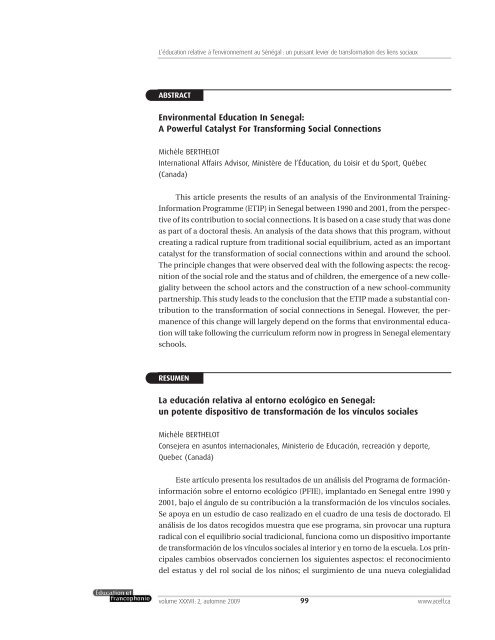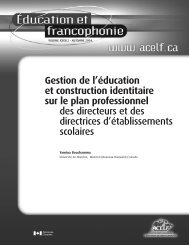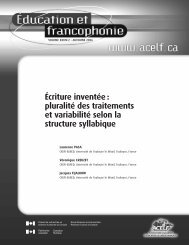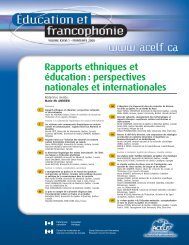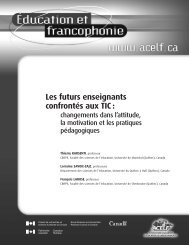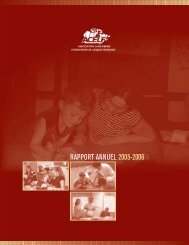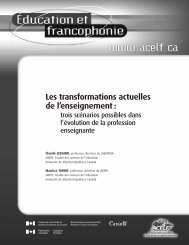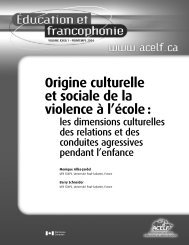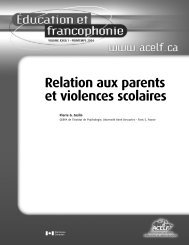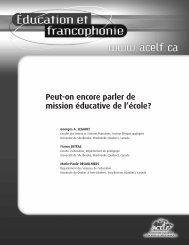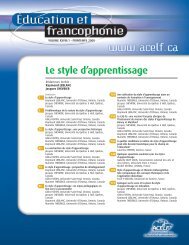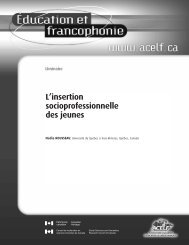L’éducation <strong>relative</strong> à l’environnement <strong>au</strong> Sénégal : un puissant levier de transformation des liens soci<strong>au</strong>xABSTRACTEnvironmental Education In Senegal:A Powerful Catalyst For Transforming Social ConnectionsMichèle BERTHELOTInternational Affairs Advisor, Ministère de l’Éducation, du Loisir et du Sport, Québec(Canada)This article presents the results of an analysis of the Environmental Training-Information Programme (ETIP) in Senegal between 1990 and 2001, from the perspectiveof its contribution to social connections. It is based on a case study that was doneas part of a doctoral thesis. An analysis of the data shows that this program, withoutcreating a radical rupture from traditional social equilibrium, acted as an importantcatalyst for the transformation of social connections within and around the school.The principle changes that were observed deal with the following aspects: the recognitionof the social role and the status and of children, the emergence of a new collegialitybetween the school actors and the construction of a new school-communitypartnership. This study leads to the conclusion that the ETIP made a substantial contributionto the transformation of social connections in Senegal. However, the permanenceof this change will largely depend on the forms that environmental educationwill take following the curriculum reform now in progress in Senegal elementaryschools.RESUMENLa educación relativa al entorno ecológico en Senegal:un potente dispositivo de transformación de los vínculos socialesMichèle BERTHELOTConsejera en asuntos internacionales, Ministerio de Educación, recreación y deporte,Quebec (Canadá)Este artículo presenta los resultados de un análisis del Programa de formacióninformaciónsobre el entorno ecológico (PFIE), implantado en Senegal entre 1990 y2001, bajo el ángulo de su contribución a la transformación de los vínculos sociales.Se apoya en un estudio de caso realizado en el cuadro de una tesis de doctorado. Elanálisis de los datos recogidos muestra que ese programa, sin provocar una rupturaradical con el equilibrio social tradicional, funciona como un dispositivo importantede transformación de los vínculos sociales al interior y en torno de la escuela. Los principalescambios observados conciernen los siguientes aspectos: el reconocimientodel estatus y del rol social de los niños; el surgimiento de una nueva colegialidadvolume XXXVII : 2, <strong>au</strong>tomne 200999www.<strong>acelf</strong>.ca
L’éducation <strong>relative</strong> à l’environnement <strong>au</strong> Sénégal : un puissant levier de transformation des liens soci<strong>au</strong>xentre los actores de la escuela; la construcción de una nueva colaboración escuelacomunidad.Este estudio nos lleva a concluir que la contribución del PFIE a la transformaciónde los vínculos sociales ha sido substantiva. No obstante, la persistenciade dicha transformación dependerá, en buena medida, de las formas que adoptarála educación ecológica una vez terminada la reforma curricular que actualmente serealiza en la educación primaria senegalesa.IntroductionLes projets d’aide publique <strong>au</strong> développement font l’objet de nombreuses critiques.Certains y voient une institutionnalisation de l’ingérence politique (Traoré,1999), l’expression d’un néocolonialisme humanitaire (Latouche, 1998) ou, encore,une contribution à l’anéantissement de la capacité institutionnelle des États, notammenten Afrique (Smith, 2003). Les analyses de N<strong>au</strong>det (1999) sur l’aide <strong>au</strong> Sahel ontmontré que les apports de cette forme d’aide se révèlent généralement peu durables,parce que les activités qui s’y rattachent sont insuffisamment prises en charge par les« bénéficiaires », notamment sur le plan financier; le plus souvent, les activitéscessent avec l’arrêt du financement du projet par les bailleurs de fonds.Par ailleurs, les analyses de N<strong>au</strong>det (1999) ont <strong>au</strong>ssi mis en évidence qu’<strong>au</strong>-delàde résultats ponctuels plutôt décevants bon nombre de projets permettent <strong>au</strong>xpopulations et <strong>au</strong>x institutions de réaliser des progrès en ce qui concerne le renforcementde leurs capacités, progrès que les évaluations de projets tendent à sousestimer.En outre, comme l’ont souligné Pesqueux et Triboulois (2004), malgré seslimites, l’approche-projet comporte un potentiel intéressant en matière dedéveloppement organisationnel. La gestion par projet est souvent utilisée pourlancer un processus de transformation. La structure de projet, soustraite à la hiérarchiepesante et <strong>au</strong>x contingences structurelles habituelles, peut être d’une grandeutilité pour enclencher une dynamique d’innovation, qui pourra par la suite êtreréinvestie dans le système.À l’issue d’une recherche doctorale sur l’implantation du Programme de formation-informationpour l’environnement (PFIE) <strong>au</strong> Sénégal 1 , nous avons constaté quece projet avait, <strong>au</strong>-delà de résultats plutôt mitigés en matière de pérennisation del’éducation <strong>relative</strong> à l’environnement (ERE), contribué à impulser une dynamiquede changement <strong>au</strong> sein de l’école et de la commun<strong>au</strong>té. L’étude dont les résultatssont rapportés dans le présent article s’intéresse à l’apport du PFIE sénégalais à1. Les réflexions qui sont livrées dans cet article s’appuient sur une recherche doctorale plus vaste. La thèse surlaquelle elle a débouché, réalisée en 2007 sous la codirection de Renée Cloutier et Lucie S<strong>au</strong>vé, s’intituleÉtude de la contribution du Programme de formation-information pour l’environnement à la pérennisationde l’éducation <strong>relative</strong> à l’environnement dans l’enseignement primaire sénégalais. Elle peut être consultée<strong>au</strong>x adresses suivantes: http://www.theses.ulaval.ca ou http://refere.uqam.ca/FR/publications_memoires.php.volume XXXVII : 2, <strong>au</strong>tomne 2009100www.<strong>acelf</strong>.ca


